
Today’s post is by far the most requested one, and as you’ve read the title, you now know what it is about. Yes! Today, I’ll reveal ALL the essays I wrote for the Lester B. Pearson scholarship at the University of Toronto 🤭
I’ll do a detailed breakdown of my answers and explain what I was thinking while writing them to help you understand the expectations of the scholarship committee in a better way.
Plus, after every essay, I’ll share the mistakes I made in my essays that you should avoid and give you some tips to help you improve your Lester B. Pearson scholarship essays, so hopefully, you become the next Pearson Scholar 🎓
Why Share Essays?
My Instagram DMs and YouTube Comments have become flooded with requests to share my essays. Initially, I wasn’t comfortable sharing them as they include my personal struggles and stories, but it took me a little longer to put myself in your shoes 👞 or even the shoes of my own younger self, who struggled during the process of writing these essays as there weren’t any example essays to get an idea of how to or how not to approach the Lester B. Pearson scholarship essay prompts.
And you know what, right now, that is 26th January 2022, there is not a single essay sample of Lester B. Pearson scholarship available online, not on Google, not on YouTube, not on any social media platform.
If you want to write the Common App essay, you have both accepted Common App Essays and Rejected Common App Essays available online to figure things out, but if you want to write a Lester B. Pearson scholarship essay, you won’t find any essay sample 🤷♂️
However, there should be sample essays of at least one student, who applied for the Lester B. Pearson scholarship, available online. So students who have little-to-no resources and guidance from their school can become aware of one way of approaching the essay questions in the Lester B. Pearson Scholarship Student Application.
This is why I have gathered the courage to share my essays with you guys because I think that my essays would’ve helped my younger self and so many other students who lack guidance and inspiration.
Before we jump right in, if you’d like to watch me read and analyze my essays, and you are someone who prefers video and graphics over text, I recommend you check out my video on Lester B. Pearson Scholarship Essays down below 🔻
My Background
If you don’t know, the Lester B. Pearson scholarship is a fully funded scholarship for international students to pursue their undergraduate studies at the University of Toronto.
If you’d like to learn in detail about this scholarship, its eligibility criteria, and the complete application process, you can read my Study at U of T for Free post.
Check Here 👉 How To Get Full Scholarship at University of Toronto as an International Student
I applied for the Lester B. Pearson scholarship last year, for the fall of 2021, and the deadline for submitting the student scholarship application was 18th January 2021.
If you’ve been on the blog for a while, you’d know that I also applied to twelve other universities in the U.S., which meant that I had dozens of essays to write, and their due dates spread across the first two weeks of January 2021.
Hence, I was busy writing their essays from mid-December 2020 till the second week of January 2021. This left me with only a couple of days to complete my Lester B. Pearson scholarship essays. So, what did I do? 🤔
I rushed through the essays and even reused the essays I wrote in the Common App to complete my scholarship application by the deadline. That is why you wouldn’t be surprised if I told you that these essays first got me waitlisted for the Lester B. Pearson scholarship, but eventually, I was rejected for the scholarship.
On a side note, if are applying for this scholarship and you’d like to know more about my personal experience of going through the Lester B. Pearson scholarship application process, the mistakes I made (which you should avoid) in the process, and my advice to win this scholarship, I highly recommend you read my post on it.
Check Here 👉 Why I Got Waitlisted For The Lester B. Pearson Scholarship at University of Toronto
Disclaimer
Looking back, I realize that my essays weren’t much thought-out. They were honestly rushed. Some did not even answer the questions properly. And there were a couple more problems in my essays that did not help me stand out and led to me being waitlisted and ultimately rejected. Therefore, please do not consider my essays as modal answers or a standard for writing your essays.
And, a big disclaimer 💀 PLEASE DO NOT COPY ANY PART OF MY ESSAYS 💀 because
- You’ll instantly get caught by the scholarship committee, and not only will your scholarship application get rejected, but you might even lose your admission to U of T on charges of Plagiarism.
- These essays did not get me accepted anyway, so plagiarizing them will not be a good idea, and you might end up on a worse route than mine.
Then why am I even sharing these essays in the first place when they did not get me accepted for the Lester B. Pearson scholarship? It is because of three main reasons.
- You’ll become aware of the mistakes you shouldn’t make by looking at my mistakes during the writing process.
- Yes, there were things I did wrong in my essays. However, not everything in the essays was problematic, so you’ll also learn some good practices that you can follow to help you write your essays.
- You’ll get an idea of how I approached these essays, and they might give you food for thought.
When I talked about sharing my essays on my Instagram Story, some of the students said that I shouldn’t do that as “the essays should be based on one’s original thoughts and ideas.”
First of all, the essay prompts for the scholarship application are subjective. They force you to think about YOUR life experiences and goals, which vary from person to person. So even if you were to copy my essays, you can’t because your interests, goals, and life experiences are entirely different from mine.
Trust me, just being yourself, the way you are, in a candid manner is the best advice I can give you for your essays. Don’t focus on what the scholarship committee wants to see you write; write what you wanna write. More on that later.
Secondly, it is one thing to copy one’s ideas outright, but it’s another to take inspiration from one’s writeup and come up with your own unique style and approach for the essays, which is what I hope you do after you see my essays.
Lastly, I think that nothing in the creative space is entirely original. We take inspiration and ideas from our lives, role models, environment, and the work of our predecessors. And whatever we come up with is influenced by a lot of these factors and more.
Austin Kleon, in his book, Steal Like An Artist, says,
“All creative work is iterative, no idea is original and all creators and their output are a sum of inspirations and heroes from whom they appropriate.”
My essays are just one sample approach to the scholarship essay questions. There are an infinite number of ways you can approach your scholarship essays.
Therefore, look at my style and the thinking behind that style, see what I’ve done right and where I’ve gone wrong, then accordingly device YOUR unique way of approaching the essays.
With that being said, let’s get started.
Academic Objectives
After your school nominates you for the Lester B. Pearson scholarship and you apply to U of T through the OUAC, U of T will send a student scholarship application link on your email. It is in this application that you’ll find all the essay questions.
The essays I’ll be sharing are based on questions in the scholarship application for the fall of 2021. U of T did not change these questions in the scholarship application for the fall of 2022, and these questions will likely remain the same in 2023, 2024, and beyond.
Still, we never know when U of T decides to change them or include additional questions alongside the previous ones. In fact, U of T did include three new questions in the 2022 scholarship application that were not present in the 2021 scholarship application. Don’t worry, we’ll discuss them later 😉
So, if you are reading this in 2023 or 2024, do not get surprised if the questions change, but no matter what questions you are asked to answer, you’ll find lots of valuable lessons from my essays.
For every prompt, I’ll:
1. Tell you the exact question which was present in the application.
2. Show you my response to that question.
3. Do a short analysis to figure out what we can learn from it.
The first section of the 2021 scholarship application was the Academic Objectives section, which consisted of one short question of 100 words and it was …
Describe your academic objectives and indicate how these are appropriate to your long-range goals. Please include specifically how a Bachelor’s degree from the University of Toronto will contribute to your achieving your longer-range goals. (100 word maximum)
See how the Lester B. Pearson Scholarship Application Portal (Academic Objectives Section) looked like when I filled my application in 2021 😊
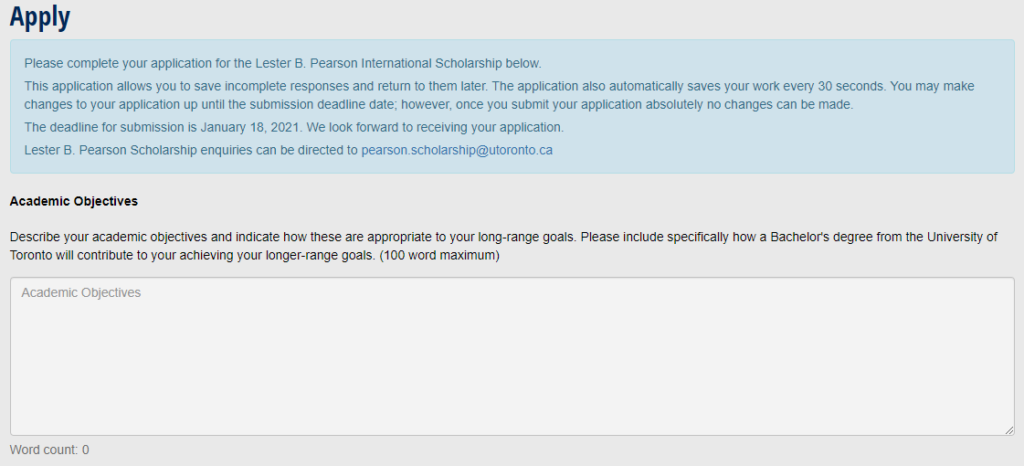
Curious to know my response 😅 Here it is !
Even though my school did not offer Computer Science (CS), I acquired a keen interest in it: Problem-solving always intrigued me, especially in Mathematics, and CS provided the answers to my questions regarding the working of the modern world.
I aim to use Artificial Intelligence (a powerful, scalable problem-solving tool) to develop innovative software projects (especially intelligent mobile apps) to tackle real-world problems like hunger and illiteracy with diverse minds (adding valuable perspectives).
Through Scarborough’s Computer Science-Entrepreneurship stream, I will combine my interests in CS, Software Engineering and Social Entrepreneurship to implement the framework/ methodologies that underlie the development of these solutions.
All right, let’s start with the positive things first.
Some students answer each part of the question separately by saying, “my academic objectives are a, b and c, while my long term goals are x, y, and z.”
However, I’ve not followed that structure. Instead, I’ve used a clear structure in which all parts of the question are answered in a connected manner and presented as a cohesive whole. I love this structure and would recommend everyone to use it as it is more open-ended, and the answer looks more connected.
Secondly, I’ve stated ‘Artificial Intelligence’ rather than ‘Computer Science’ when I talked about developing innovative software projects. This is because Computer Science as a field of study is too broad. So, to narrow my interest and create focus, I mentioned a branch of CS that I particularly found exciting and that I’d use to develop solutions.
The irony is that, now, learning more about AI, I find that mentioning ‘Artificial Intelligence’ itself looks too broad 🤨 because AI also has various branches such as neural networks, machine learning, etc.
Another thing that I think I did pretty well is the inclusion of a few keywords that convey a lot of meaning.
If you look at the second paragraph, I’ve mentioned ‘hunger and illiteracy’ because most of my extracurriculars were associated with tackling these problems, and mentioning these shows the reader that I’m deeply passionate about addressing not just any global issue but precisely these problems.
Moreover, I’ve mentioned ‘diverse minds (adding valuable perspectives)’ to convey the message that I know the uniqueness of Toronto, which is the fact that it’s one of the most multicultural cities in the world. And getting surrounded by students from different backgrounds will add valuable perspectives to the solutions I’ll develop. So you see, in just a few words, I’ve said so much about my aims and values.
Let’s move on to the mistakes I made. There are so many of them. I don’t know where to start 😵
The first mistake I made, and that’s what a lot of students make, is that they do not read the question properly, leading them to make two more mistakes.
❌ Not addressing all the parts of the question.
❌ Including Irrelevant details and information in the answer.
In the first paragraph, I’ve briefly talked about Computer Science and why I’m interested in that field, but if you look at the question, nowhere is it asking you to describe why you’re interested in a particular program or major.
So even though my first paragraph helps the scholarship committee learn more about me and why I’m interested in a particular area of study, it does not meet their expectations as it includes irrelevant details that don’t address any part of the question.
🔴 This is a red sign for the scholarship committee because they’d think that I’m not interested in the scholarship as I haven’t even taken the time to read the question properly and prepare my response.
Therefore, before you answer any question, it is really important that you read the question critically, so you are able to avoid irrelevant details and address all parts of the question.
A good strategy to address all the parts of the question is to
- Break the question down into separate parts that need to be addressed.
- Brainstorm possible answers for each part.
- Plan your answer accordingly.
If you do this 👆 for every question, you will automatically get into the top 50% of the applicants because half of the students do not take the time to do these things.
This question is a three-part question where you need to first describe your academic objectives, then talk about how they will help you reach your long-range goals, and thirdly, how U of T’s education specifically can aid the process and ease your journey to reach your goals.
If you critically evaluate my response, you’ll notice that I have only addressed two parts of the question and that too, in an incomplete fashion. One, I’ve talked about one of my life goals, which is to use AI to solve real-world problems. And two, how U of T’s education will help me achieve that.
In terms of the demands of the question, I haven’t described my academic objectives and how they relate to my long-term goals. I think the scholarship committee would’ve had a hard time understanding my exact motivation to get educated at U of T because just stating that ‘I want to solve real-world problems through AI’ isn’t sufficient rather, I should’ve mentioned exactly “how” I want to achieve this long-range goal.
This costly mistake could’ve been easily avoided had I just stated my exact academic objective: starting a tech startup in the AI space. Therefore, do not forget to include your concrete academic objectives and tell the reader exactly how they will help you realize your goals.
Another element that might seem simplistic but would’ve indeed taken my writing to the next level is specificity.
Although I’ve been quite specific in terms of my long-term goal in the second paragraph, I haven’t been that specific in describing exactly how U of T Scarborough’s Computer Science Program will help me develop solutions to real-world problems 🌍
I think it could’ve been much better, in terms of specificity and impact, if I had mentioned a few specific classes from the program or research work of a professor that I find particularly interesting and that would help me develop those solutions.
Furthermore, if you notice, the terms ‘methodologies,’ ‘framework,’ and ‘solutions’ in the last paragraph seem pretty vague and generic, and it makes the reader question, ‘what exact methodology or framework from UTSC’s program would you like to learn and implement?’ and ‘what exact solutions are you talking about?’ etc.
The lesson for you and me here is not to include big words just because they sound impressive; instead, use words that convey the message correctly, even if they are simple and not fancy.
Overall, I could’ve massively improved this answer had I removed vague statements, avoided generalization, and included specific academic objectives and goals.
Self-Letter of Reference
The second section of the scholarship application was the Self-Letter of Reference, which had one question with a word limit of 300 words and it was…
The students who are nominated for the Lester B. Pearson International Scholarship are students who have demonstrated exceptional academic achievement and creativity, who are accepted as leaders within their school, and who have the potential to contribute to the global community in the future. They can be distinguished from other students who may have equally high academic results by virtue of their breadth of interest, intellectual energy and impact on the life of their school and community.
Write a letter of reference for yourself in the third person describing how the applicant (you) meets these criteria. The letter should refer to the specific achievements and experiences. It may also comment on any weaknesses. (300 word maximum)
Screenshot of Self Letter of Reference Section in 2021 Scholarship Application 😲
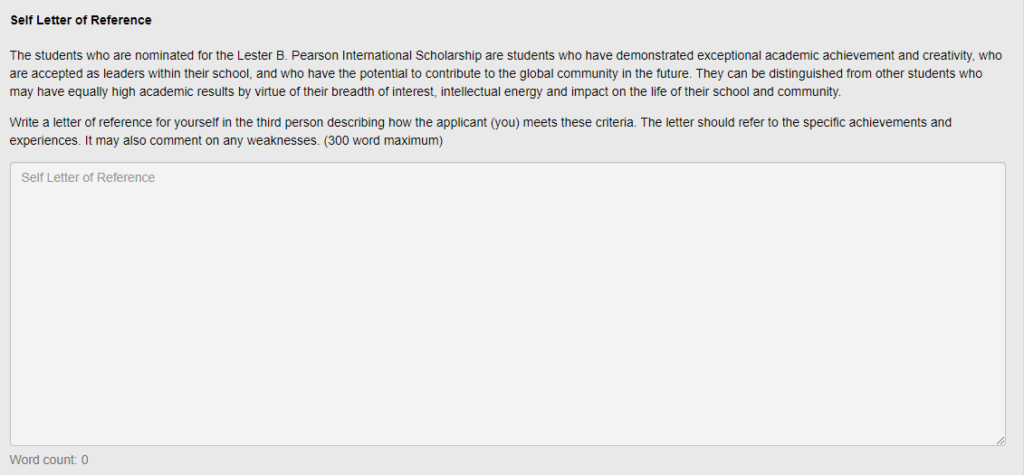
Here is the answer I wrote 👇
Note: the following barely describes Zohair.
Zohair’s school is not a world-class school with massive resources. Despite most of his high school teachers teaching the IGCSE and IBDP Curriculum for the first time, subject teachers changing several times, and not having a Physics teacher for months, he secured grades that were never achieved by any school student before.
Getting a 7 was challenging but inspiring others to get a 7 was hard: he explored online resources, corrected his teachers’ approach to Internal Assessments, organized Physics classes, interacted with IB Students around the world via Whatsapp and guided peers.
In his pursuit to help others, he initiated seemingly small but transformative school changes such as displaying formulas in class walls, reading books on the school bus, and teaching students after school for free. During the Pandemic, he guided students through virtual meetings and started a free college counselling program after the school’s counsellor resigned.
Zohair was a:
Project Infaaq Leader (raised $17.5k; fed 700 families; recognized by IBO), Student Council Captain (organized 1st ever SC assembly; recognized as best SC in school’s history), MUN 2019 Secretary-General, Computer Skills Introduction Leader (taught computer basics to low-income students), Kerala Flood Relief Initiative Leader (raised $800 in 15 days; commended by Habitat NGO), Winter Clothes Collection Leader (donated 1000+ clothes to the homeless) etc.Zohair is a:
Teacher (teaching his younger brother daily), Counselor/Mentor (guiding students in college applications), Tech. YouTuber (5+ years; 450+ videos; 5M+ views), Blogger (80+ posts; 700,000+ views globally),Video Editor (MUN and Project Infaaq video team leader), Photo Editor (social media graphic design), Animator etc.And with his breadth of viewpoints and unique background, he has massive potential to contribute to U of T’s inclusive yet diverse community while opening doors for low-income Indian students like him to pursue world-class education and become leaders in their communities.
There are a couple of good things about this essay, but there are equally bad things about it. Let’s start with the good ones again.
Firstly, the scholarship committee knows my final IB Diploma score, which was a 43/45, and they have a lot of applicants with similar if not better scores. So what I have done in the first two paragraphs is to give the context behind the score by stating my educational background, lack of resources, and the obstacles in my way.
This shows the scholarship committee where I am coming from and helps them understand my unique situation and challenges to get a score of 43 in IB. I’m showing that it was really challenging to get this score in an environment with no world-class resources or facilities.
Secondly, you can see that in the third paragraph, I’ve highlighted the quality of helping others and given a pieces of evidence and instances as a third person of when that quality shined in my personality.
The quality of helping others was one of the core values I focused on in my college applications, be it in supplemental essays or college scholarship essays, and you will see it again in the coming essay too 😁
Thirdly, I have mentioned the different roles and responsibilities I’ve taken up in high school and continued to take up in my gap year, which enriched me with different viewpoints and perspectives.
And not just that, I’ve stated the personal and collective achievements in all of the different endeavors; thus, showing that I have not only taken up a wide range of roles and participated in various projects but have made significant impacts in them.
I covered all of the roles and their achievements in the fourth and fifth paragraphs, and in the last paragraph, I explained my purpose behind mentioning all of the different roles and achievements.
It was to show the committee that I have great potential to make meaningful contributions to U of T because being successful in different endeavors has equipped me with various perspectives. In short, I’m telling them that I can take up and excel in various roles in college very easily because of my past experiences.
This essay may now seem impressive, but it won’t, in a minute. 🤨
Do you know how did I come up with this answer? If you have completed your Common App, it wouldn’t be hard for you to believe that I chose some of the achievements from my Common App activities section and added them here because, at that time, I didn’t have much time to think of a better way to answer this question.
So reusing and recycling my previous essays was the only option. What I learned from it was that whenever you are in a rush, no matter how good your answer seems to you at that moment, you will have made certain mistakes without even realizing it.
The first mistake I made here is quite obvious, but it wasn’t that obvious when I wrote this. I think you’d have spotted this mistake easily, and it is talking about way too many ideas in an unclear fashion and not elaborating on them properly.
Remember that the scholarship committee reading this wants to know the person, their struggles, and the story behind the roles and achievements, not just the numbers. It is better to have a few roles and achievements with explanation and elaboration rather than having ALL of your impressive feats listed out. 📃
Had I taken a few ideas and gone deep in them, this response would’ve turned out much better because lists of achievements aren’t as memorable and impactful as concentrating and giving context on a few key points.
For instance, in the second paragraph, I’ve mentioned a couple of steps I had taken to improve education. It would’ve been much better if I had just taken the first sentence, “Getting a 7 was challenging but inspiring others to get a 7 was hard,” and given more information on HOW I inspired others to achieve the best possible grades.
Maybe, by stating that I taught them different subjects, cleared their doubts, and assisted them with their projects. In other words, simply saying that, “I inspired others to get a 7,” isn’t that impactful because it lacks context, background, and explanation.
Therefore, focus on a few ideas and let the reader know the story and struggle associated with those ideas. 👊
By the way, if you don’t know what a 7 means? In IB you get a score from 1 to 7 in each subject based on your performance in exams and internal assessment. That’s why I said getting a 7 and inspiring others to get a 7 😁
The second mistake, and this one is quite funny. You see, the first line of my essay, “Note: the following barely describes Zohair,” is entirely unnecessary because the scholarship committee already knows that these essays are just a snippet from the life of the students, and they do not fully describe them.
Therefore, avoiding using phrases like “this barely describes the student” or “this essay’s limited word count isn’t allowing me to fully express myself” as they are completely unnecessary. Plus, they eat up your valuable word count, which could be better used for other purposes.
The question I shared with you was the only question in the Self-Letter of Reference section of the scholarship application in 2021. However, in the 2022 scholarship application, the University of Toronto introduced another question, which is:
From your self letter of reference, please list your top 5 accomplishments, achievements, experiences and/or activities in descending order. These can be of any nature: extracurricular, civic, artistic, sporting, academic or other.
As you can see, this question is directly related to the letter of reference question I just shared with you. If you are familiar with the Common App, you’ll notice that it is really similar to the Common App Activities Section, where you are required to list down and share the achievements of a maximum of 10 Activities you engaged in high school, starting with the ones you consider the most important.
The Common App Activities section has a drop-down for selecting the category of the activity, and in the same manner, U of T has also mentioned the different categories of activities at the end of the question. Thus, opening more possibilities and avenues from which you can list the activities.
There is a lot more I want to tell you about these questions, but it would make this post too long. So, I’m planning to do a detailed breakdown for all of the Lester B. Pearson scholarship essay questions and will be going into great detail about how to answer them step-by-step in another post, which I’ll soon upload on this blog. Stay tuned for that 😉
Essay
The third section is the lengthiest of all the sections in terms of the words you’re required to write. It is the Essay Section, which contains one question of 800 words. And it goes like this…
Describe a personal life experience that has had particular significance for you and highlight the reason(s) it was significant, whether it had an impact on others, and any insights or understandings you gained from it. (800 word maximum)
The Essay Section of the 2021 Scholarship application right below.
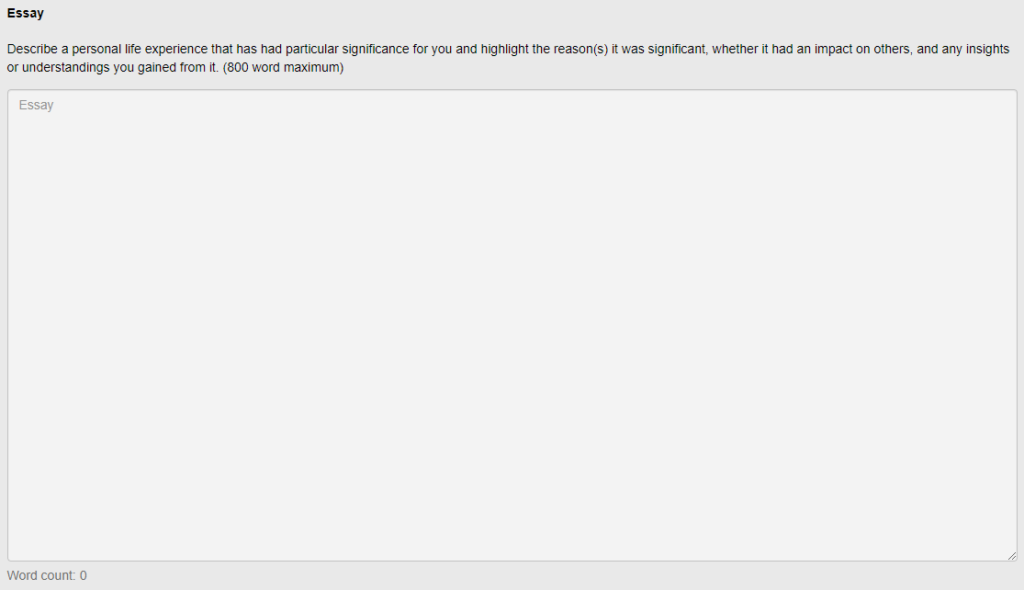
The response to this question is quite personal, and this is the answer that I was especially hesitating to share, but I decided to do it anyway. It requires a little background about myself before I can share it with you.
I grew up in a joint family 👨👨👦👦 of around thirty people with all of my cousins, uncles, and aunts living together; however, when I entered high school, that joint family broke apart due to financial disputes and greed of some of the family members.
My immediate family, especially my father, had to bear the brunt of this breakdown both financially and emotionally. He had to work really hard to support my education and other family needs. My essay highlights the emotional and financial impacts on me. And how these hurdles changed me and my perspective on life.
Moreover, it highlights a tragic historical event that my father witnessed as an adult. It is the Bhopal Gas Tragedy which is also the worst industrial disaster in the world. In short, an American company was making pesticides with highly toxic chemicals and without proper safety measures in Bhopal, which is my hometown. 😲
The lack of safety precautions led to a mass leakage of a poisonous gas named Methyl Isocyanate, which enveloped the city, made it a gas chamber and killed thousands of people in a matter of hours.
That’s it for the background. Here is what I wrote 👇.
Upon entering high school, my life completely changed—I lost my identity: I was forced to leave a household that had nourished me for 15 years. Seeing the smiling faces turn into disgusting looks and cheerful gatherings turn into aggressive disputes developed in me one predominant feeling—Grief. I was at the most critical junction of my education, yet my family failed me when I needed them the most.
I questioned the people that had raised me: Why are these difficulties imposed on me by my own blood? Shouldn’t they be the first ones to take care of me? Questions like these always preoccupied my mind. When I was at school, math problems that once fascinated me yearned for my attention. When I was at home, financial constraints only reinforced my questions.
Soon, these unanswered questions turned into judgments:
“People can do anything for money.”
“People only care about themselves.”
“People are only good for a reason.”
When my benchmate shared his tiffin, I knew that he would ask me to solve a math problem for him next. When my mom met me with a smile, I knew she would ask me to dry the laundry next. From businesses to governments to relationships, everything seemed to involve some sort of gain or “profit.” Unconsciously, I saw everything and everyone from this lens.
Eventually, as financial difficulties intensified, my sadness transformed into RESENTMENT—a resentment towards my parents.
Why is my father not present in the School’s Award Ceremony to appreciate his son’s efforts? Why am I the only one whose parents haven’t saved for my college education? Why do I have to self-study when my peers have joined the city’s best coaching institutes?
My father reached out.
As a kid, my father would collect cow dung after school to support his family. There were times; few days would pass by, working, without a morsel of food or a minute of sleep. “Life was a blessing, until Bhopal Gas Tragedy (the world’s worst industrial disaster),” my father said with tears in his eyes.
Note: the following barely describes what happened/ is happening. Forty tonnes of methyl isocyanate was stored without adequate safety measures (to save costs) by “educated” people, knowing it could kill the whole city. On 2nd December 1984, the toxic gas leaked, killing 4000 people immediately. Every minute, the gas diffused and moved faster and faster—shock, confusion, cries.
Amid the chaos, a worker ran towards the leaking tank. In attempting to stop the leakage, he died of poisoning.
“Be like that young man,” my father said with trembling lips. My father wouldn’t be alive, had the man not closed the leaking vessels. “He sacrificed his life to save others.”
Suddenly, everything was put into perspective. I saw my difficulties infinitesimally small compared to the struggles of my father. I realized that the life I complained about is much better than the life my father wished he had in his youth.
Thousands of humans and animals are breathing, just because a man decided to risk whatever he had to help others. I’ve tried my best to imbibe the legacy of this forgotten hero. From surveying hundreds of needy families in school holidays, replying to thousands of questions in YouTube comments, pulling all-nighters for helping my friends in their Physics Projects, to teaching juniors in the school bus, I’ve pushed myself to act beyond myself and help others.
My father’s eyes reflect every impoverished individual who had to lose education—most basic right—to feed his family. And anyone having to lose this right is one too much. This is why I want to educate myself, not to get a comfortable job in Silicon Valley, but rather to build lives by giving education back to my townspeople. More importantly, I want to revive the legacy of this young man by thinking and acting beyond myself in any endeavour I step into. In fact, this value has remained a guiding light in all of my high school pursuits.
All this time, I was looking at everyone from the same lens, just judging and guessing their intentions, without realizing that the intent is best known to the person, which can only be revealed when we reach out with an open heart. Thus, when I see dejected faces, I see myself in them, I respect. I approach. I talk. I help. Because I know stories and perspectives are waiting to be heard, just seeking companionship.
Upon entering high school, my life completely changed—I found myself, a forgotten self. Being turned “underprivileged” by my own blood, actually privileged me with a higher appreciation of basic needs, guided me to respect individuals’ unique circumstances, and above all gave me a direction to think beyond myself.
This was my answer. Seems quite heavy, isn’t it? There is so much to talk about here. Let’s break it down, starting with the good practices.
If you look at the first paragraph, you’ll notice that I started with a shocking and ‘hooking’ statement: Upon entering high school, my life completely changed—I lost my identity. This makes the reader really invested in the essay with several questions popping into his mind like “what changed in his life?” “what was the identity he lost?” and “how did he lose his identity.”
The next few sentences of the paragraph are just building more curiosity and revealing the meaning behind me ‘losing my identity.’ I think using a captivating statement that gives the reader various questions to think about is a great way to start long essays.
The next element is really interesting, and it is something I have seen in many great essays, which is The Full Circle Strategy. In the Full Circle Strategy, you begin with an anecdote or story at the beginning of your essay, move away from it to explain things but come back to it in the conclusion by referring to the same anecdote or story to make a full circle. ⭕
For instance, take a look at the first paragraph, which says, “Upon entering high school, my life completely changed—I lost my identity: I was forced to leave a household that had nourished me for 15 years…I was at the most critical junction of my education, yet my family failed me when I needed them the most.”
Now, have a look at the last paragraph, it says, “Upon entering high school, my life completely changed—I found myself, a forgotten self. Being turned “underprivileged” by my own blood, actually privileged me with a higher appreciation of basic needs, guided me to respect individuals’ unique circumstances, and above all gave me a direction to think beyond myself.”
So, do you see how everything is coming full circle? I began with “losing my identity” due to family disputes and concluded with “finding my identity” due to family problems and their lessons. 🔁
Also, I used the same initial statement to refer back to the beginning and show the reader that my perspective has shifted even though the problems remain the same.
Initially, I thought, “I lost myself”, but due to the events that happened after the family breakdown, I not only “found myself, my history” but learned valuable lessons like appreciation of basic needs, respecting individuals and thinking beyond myself.
In short, use the Full Circle strategy if you can, and it’s not that complex. Remember, when you end your essay, bring the readers back to the beginning of the essay, where you described your story or anecdote, and help them understand it through a different lens.
All right, next, let’s talk about some key features I’ve used to organize and structure my essay.
Firstly, this essay doesn’t contain big chunks of text. Rather, I’ve used short paragraphs, sometimes even one-sentence paragraphs, as not to overwhelm the reader and make my writing more inviting and easier to read. short
Secondly, I’ve used varied sentence structures to convey my message. I’ve asked questions; added long sentences, short sentences, two-word sentences; and included dialogues to make my essay as effective and engaging as possible. Having the same sentence structure leads to monotony and repetition, making your writing less lively in general. 😪
Since we are talking about structure and organization, let me tell you that you won’t find any high-level words in my essay except for four – predominant, yearned, infinitesimally, and impoverished. This is because I think clarity is more important than including high-level, fancy words, and clarity often comes through simplicity in language and being natural with one’s voice.
So please do not think that if you’ve not used high-level words, your essay isn’t impressive. If it’s clear and simple, it will make a lot of impact. And even when I’ve used high-level words, I didn’t search online for them or use a dictionary; instead, they came naturally in my mind as I was writing this essay. So yeah, be natural and write as if you are talking and describing your story to a friend of yours. 🤗
Apart from all of this, another really important thing to keep in mind is to convey your values and qualities through the essay. Before I explain this, let me ask you something – What are the three qualities or values did you learn about me from my essay? Stop reading right now ✋ and let me know it in the comments and then get back to reading. Remember, you have just a few words to tell me that.
Okay, now that you have written it, let me tell you what values I wanted to convey to the reader through my essay. Overcoming obstacles, helping others, and thinking beyond myself. I have conveyed these values by showing them in practice, not simply telling them. Many students directly state that “I overcame financial difficulties” or “I am really concerned about justice in my community” without showing these values in practice in the essay.
Let me give you an example of how I showed the scholarship committee that I like math and I’m good at it without stating it directly. Have a look at the second paragraph, which says, “When my benchmate shared his tiffin, I knew that he would ask me to solve a math problem for him next.”
In this statement 👆, very subtly, I’ve hinted that I’m good at math as my benchmate would ask me to solve math problems for him. Alongside my good math scores, perhaps, this shows, though in a minor way, that I’m competent for my top choice program, which requires good math skills.
This leads me to another good example of showing and not just telling. Have a look at the last fourth paragraph, which says, “From surveying hundreds of needy families in school holidays, replying to thousands of questions in YouTube comments, pulling all-nighters for helping my friends in their Physics Projects, to teaching juniors in the school bus, I’ve pushed myself to act beyond myself and help others.”
I’ve mentioned four instances where I had acted beyond myself and helped others, and myself, and I took these instances from some of my main extracurricular activities in high school. Basically, I’ve first shown them everything in practice and then told them the meaning behind stating it through the statement “I’ve pushed myself to act beyond myself and help others,” which also implies, by extension, that I’ll continue to help others in college. 🏫
Now, you won’t know this, but let me tell you that there is so much more to talk about in this essay because this is basically my Common App essay. I’ve shortened it a little bit to fit the word count for this question; however, the essence and structure of the essay is the same.
Again, I had to use my Common App Essay here because of the lack of time, and that’s why if you look at the expectations of the question and my essay, you’ll find that I’ve not addressed the question as fully and deeply as it demands. Even though the scholarship committee purposely creates these application questions to be open-ended to open more possibilities for the answer, they do expect students to not deviate substantially from the different parts of the question.
For this question, students are expected to talk about ‘a particular experience,’ but in my response, although I’ve mentioned that experience in which my father tells me his story, I’ve not focused much on that ONE experience. Instead, I’ve used most of my word count to talk about my background, struggles and my father’s context. 😞
In other words, my essay doesn’t revolve around that one experience that the scholarship committee expects, but rather it is about the general struggles in my life and how I found meaning in them.
Let me tell you, this is a big problem with this essay in regards to the question, and this is what actually happens when you try to fit one essay created for one purpose into another question with different expectations. It leads to significant deviations from the demands of the question, and you won’t even realize it like I couldn’t back then.
Another thing I didn’t realize was to change the word “Silicon Valley” to “Toronto.” I wrote about getting a comfortable job in Silicon Valley because through the Common App, I was applying to American Universities and most tech graduates aim to get jobs in Silicon Valley as it’s the tech hub of the US. However, when I am writing this essay for U of T, which is in Canada, I should’ve rather changed it to Toronto because that’s the tech hub of Canada. 🙄
Therefore, never fall into the trap of reusing and recycling other essays. If you have time, analyze the question, feel free to derive ideas from your essays in other college applications, but avoid copy-pasting entire or huge chunks of your already written essays for these questions.
Another big mistake with this essay is the need for background. Since the scholarship committee didn’t know my background and the context behind several situations, it would’ve been difficult for them to understand and relate to the things I was sharing in the essay. It would’ve been all right if I had shared my background with the scholarship committee. 😮
In the additional information section of the Common App, I had mentioned my family situation in detail. For that reason, it wouldn’t have been difficult for my Common App Colleges to understand this essay because they would’ve read and known that I got separated from my extended family.
But the scholarship committee for the Lester B. Pearson scholarship wouldn’t have known this as there was neither an additional information section in the scholarship application nor did I mention my family context in the essay itself.
Giving the background is something I didn’t realize back then; however, after viewing this essay as a third person, I began to see the lack of context in the essay itself. Therefore, the lesson for you here is to make sure you provide enough context and background to the situation in the write-up itself so the scholarship committee can understand your situation fully and deeply.
Do not assume that the scholarship community knows about you, your school or your family situation. These essays are the only piece of writing they have available with them. So try to explain most of the things in your essays. 📝
Apart from all of this, I think one more issue, though not a major one in my essay, but a big one in many essays is irrelevancy. If you are asked to talk about an experience, whatever you say should relate to it.
Do not go on in great detail and describe other things, experiences or challenges unrelated to the essay’s main focus. For instance, in the twelfth paragraph, I’ve said, “Note: the following barely describes what happened/ is happening,” which is not at all needed, and it unnecessarily eats up the word count.
On a side note, let me tell you a positive example of being relevant in the essay. In the eighth paragraph, I’ve mentioned that the financial difficulties I experienced led to resentment towards my parents. Then, in the next paragraph, I’ve asked three questions to explain this resentment better. 😓
- My father was busy earning money, so he couldn’t attend school meetings.
- Whatever money he had saved was not with him due to the family dispute.
- I couldn’t join coaching institutes due to the lack of money in the family.
So you see how all of the three questions point at situations of financial hardship and directly relate to the resentment I talked about in the previous paragraph.
In short, write whatever is relevant to the experience and avoid irrelevancy by removing ideas that do not relate to the main theme of the essay, no matter how much attached you get to them.
Additional Questions
The Additional Questions section is the final section of the scholarship application consisting of two questions, a short essay of 100 words and another question requiring a numerical answer.
All right. Let’s start with the first question, which said…
“If you are not awarded a Lester B. Pearson International Scholarship, what are your plans for the next four years? (100 word maximum)”
The Additional Questions section in the 2021 student scholarship application 👇

Here is my response ✍
Right now, I should be a high school dropout labouring alongside my father. ONLY because of my school (world’s lowest costing IB school), its mission (producing professionals with strong ethics), its people (left five figures for the community), and its resources (provided me 100% scholarship) was I able to nurture my impact-oriented mindset.
I will continue serving my school by guiding students in the IB Program and College applications, regardless of receiving the scholarship. Moreover, I plan to attend a local college, self-learn CS through online courses and develop apps using Flutter while scaling up my content creation (YouTube and Blog).
This question is quite straightforward and asks you about your plans for the next four years if you don’t receive the Lester B. Pearson scholarship.
I think what’s good about my answer is that I’ve highlighted specific activities like guiding students, developing apps and creating content that I’ll continue to do or that I plan to undertake in the next four years. But I feel that this is not enough to answer this question fully and deeply. 🤔
You see, even though I have mentioned that I plan to attend a local college or self-learn CS or develop apps through Flutter, neither have I given an adequate description of these activities to help the reader understand them better nor have I stated the reasons behind doing them which the scholarship committee would be most curious to know to understand my vision and goals.
On top of this, when you look at the first paragraph, you’ll find it completely unrelated to the question. It doesn’t discuss my plans for the next four years or what I’d do if I didn’t get the scholarship. 😶
Although the first paragraph helps the scholarship committee know more about the role of my school in helping me develop an impact-oriented mindset, it does very little to address the question, and so for the scholarship committee, this paragraph wouldn’t be impactful enough because they are expecting the student to talk about their backup plans if they don’t receive the scholarship.
Do you know where did the first paragraph come from? I copied it from one of my supplemental essays in Common App, thinking it would look good because it is impactful and well-written 😔.
However, little did I realize that focusing on the question is the best way for a constructive response and that irrelevant details, no matter how good they seem, don’t help your essay or application.
The scholarship committee asks you this question to know your preparedness and attitude towards future plans. They want students who know where they are heading and have good, constructive plans for the future. They look for students who are not planning or thinking about their goals because of a college or scholarship program they want to get into, but rather they are habitually doing it to better themselves and their communities. 🚴♀️
This doesn’t mean that you should know exactly what you’ll be doing in the future because nobody does; however, you should have an idea of what you’ll be pursuing if you don’t receive the scholarship.
Therefore, the key to answering this question is to
- Set SPECIFIC goals for yourself related to your interests and mission in life, no matter what grade you’re currently in.
- Have proper, specific plans for yourself to be able to achieve your goals and
- Be very specific when describing the goals and plans in your answer. In other words, don’t forget to convey the what, how and why of your future plans.
Okay, now let’s move on to the second question of the additional information section, which was slightly different as it required the students to answer in numerical terms instead of writing an essay in other questions. This question was…
How much will your parents, guardians or other family contribute each year while you are at university (in Canadian dollars)?
Honestly, I don’t exactly know what I wrote for this question, but what I can tell you is to be honest, and genuine with your answer. Tell them exactly how much your family is expected to contribute to your education for each year of the four-year program without the amount burdening them. 💰
There is no right or wrong answer. It totally depends on your family’s financial situation. So yeah, give an honest answer for this. And remember to accurately convert the amount from your home currency to Canadian dollars. Otherwise, it would be a huge mistake on your part. 💱
When I applied for the Lester B. Pearson scholarship for the fall of 2021, the two questions I just shared with you were the only two questions present in the Additional Questions section. But for the fall of 2022, U of T’s scholarship committee included two more questions in this section, though not very different from the existing ones.
The first one was this one 👇
If you are awarded a Lester B. Pearson International Scholarship, how will you contribute to the Pearson Scholarship program and our community of Pearson Scholars? (100 word maximum)
In this question, they want to know what you’ll contribute to the community if you become a Pearson Scholar. If you remember in the first question of this section, they also want to know what you’d do if you don’t become a Pearson scholar. You see how U of T’s scholarship committee is assessing you and your vision so thoroughly by asking these two questions.
Apart from this, another question that was introduced in the scholarship application for the fall of 2022 was this 👇.
How much do you expect to have saved personally to fund your university studies (in Canadian dollars)?
This question was asked alongside the second question of this section, so U of T can get an idea of both what you’ve saved for your education and what your family has saved for your education. Again, there is no rocket science here 🚀
Simply and honestly, state the right amount ☑
Conclusion
3 BIG Mistakes that led to my rejection for the Lester B. Pearson scholarship 🙅♂️
❌ Not Starting Early.
❌ Not Reading and Breaking down the question.
❌ Recycling and Reusing my Common App Essays for the scholarship application questions.
3 BIG Tips that can make you the next Pearson Scholar 🤓
✅ Plan your answer according the demands of the question.
✅ Be Specific and avoid generic, vague stuff.
✅ Show first and tell later.
This was the complete scholarship application for the Lester B. Pearson scholarship and my answers to all the questions.
Honestly, I had no plan of writing this post, but when I posted about sharing my Lester B. Pearson scholarship essays on my Instagram story, 94% of you guys voted yes for it, so I decided to create it anyway.
By the way, if you’d like to get in touch with me, feel free to DM me on Instagram. I’d be more than happy to help you there.
If you guys have any questions, comments or feedback on any of my essays, please do let me know in the comments below ✍ because I might have missed many things while analyzing these essays and also because if you put your thoughts and opinions in the comments, it will help everyone get exposed to multiple perspectives of looking at the same essay. And that will, in turn, help everyone with their writing process.
If you found this helpful, do share it with those that might need it.
If you’d like to see my college and scholarship-related videos, I recommend you Subscribe to my channel on YouTube so you don’t miss any of my upcoming videos.
Lastly, I would like to thank you so much for sticking around till the end. I hope it was worth reading this post. Do comment, “I read till the end, and it was worth it”, in the comments below to help me know that I didn’t waste your time.
Again, thank you so much for your time 🙏
See you in the next one.
Good Bye, and Take Care 😄





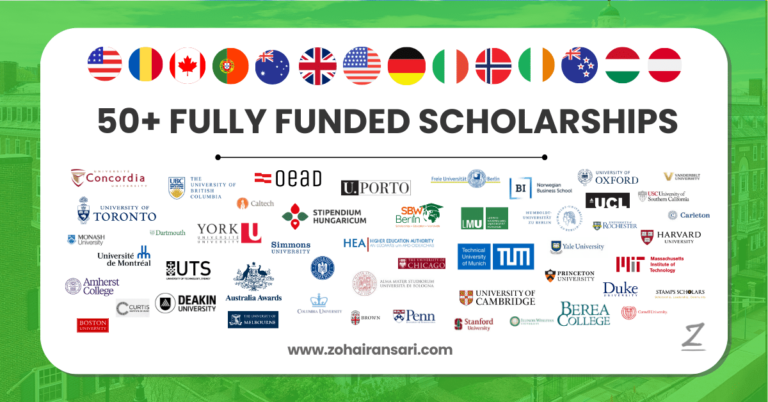
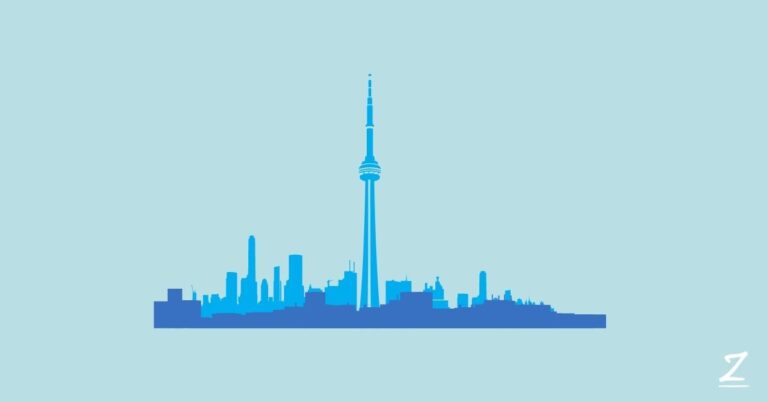
I read till the end, and it was worth it.
Thank you very much for sharing this!
I read till the end and it was worth it. Thank you so much zohair for this wonderful act of kindness. May you reach heights.
Thanks mate!
Hi Zohair 👋🏾.
I read till the end and it was worth it! Thanks for investing so much into putting this article together.
I have a question for you.
Do you think it’s too late to begin my Pearson Scholarship application now?
Thank you in anticipation of your response.
Yes, as of 14th November 2022, if your school isn’t approved by U of T then it would not be possible for you to apply this year as the school registration process takes at least 4 weeks (based on my experience).
Thanks for sharing
You’re welcome.
I read till the end and it was worth it!
Thanks for an enlightening descriptions — which are so detailed.
This is honestly a life savior! Thank you so much for sharing this
Thanks for sharing!